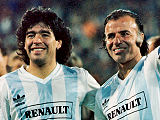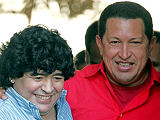Political football: Diego Maradona
Updated on 26 June 2007
Diego Maradona dominated world football for 15 years. He also acquired a turbulent political hinterland outside football. Simon Kuper nominates the Argentinian to captain his Political Football First XI.
Diego Maradona: number 10, team captain
When George Bush showed up in Argentina in 2005, the usual protests against him were led by someone rather unusual: Diego Maradona. The little genius asked Argentines to march against the "human garbage" Bush.
Thousands did, though as it happened without Maradona, who cannily preferred to get a lift to the stadium where the anti-Bush rally was held.
The rally's other main voice was Venezuela's president Hugo Chávez, and it's no coincidence that on 26 June, Maradona will kick off the opening match of the Copa America football tournament in Chávez's country.
Maradona captains our political footballers' eleven, because few other great athletes are so political. Think, by contrast, of the human advertising billboards Pele or Michael Jordan.
In 1990, Jordan wouldn't even endorse the black civil-rights leader Harvey Gantt in his race for Senate in Jordan's own state, North Carolina, even though Gantt's opponent, the Republican Jesse Helms, was famously no friend of the black man. Jordan explained: "Republicans buy sneakers too."
Share Maradona's politics or not, at least he has them. And his own political trajectory over the last 30 years is a case-study of Latin America's trajectory in that period.
Maradona could have been anything he wanted to be, even president of any place in the world.Agustin Pichot, Argentina's rugby captain
Maradona entered professional football aged 15 in 1976, the year Argentina succumbed to a military junta. In those days, said Maradona, he had "no time" for politics. But politics had time for him. The junta embraced the prodigy. In return Maradona once embraced General Galtieri, one of the junta's leaders.
After winning the world youth cup for Argentina in 1979 the kid appeared on the radio, and in the words of his biographer Jimmy Burns, "seemingly content with the drooling messages of support from a line of generals". Today Maradona loathes that regime.
In Argentina, politics is often not so much about the right or the left but more about nationalism. Whatever Maradona's political shifts, he has always been a passionate nationalist. That was his common ground with a thug like Galtieri. "If one day our armed forces have to defend our country," Maradona said at this time, "there will be soldier Maradona, because first and foremost I am an Argentine."
Email us your Political Football suggestions
Over the coming months Simon Kuper will be nominating his Political Football First XI - 11 footballers whose lives have acquired a dimension outside the sport they play.
But we want to know who you would include. It doesn't have to be an entire team (although that would be fascinating) - just a player for whom life has meant more than a mansion in Belgravia and a fleet of 4x4s.
Email your suggestions to Channel 4 News by clicking here.
However in 1982, when the armed forces invaded the Falklands Islands and fought a war with Britain, there was no soldier Maradona. He was preparing for the World Cup instead - but he shared the national sentiment.
Four years later, when Argentina met England at the World Cup, he finally did his bit. He beat England, scoring once with "the hand of God", and later with a divine left foot.
"It was as if we had beaten a country, not just a football team," Maradona wrote in his autobiography. "Although we had said before the game that football had nothing to do with the Malvinas war, we knew they had killed a lot of Argentine boys there, killed them like little birds. And this was revenge."

With Carlos Menem
Because even as a footballer Maradona was a politician. Every time he touched the ball, the malnourished little boy from the slums incarnated the little man fighting great powers. He enhanced that image when he accused Fifa of conspiring against poor Argentina.
The recent Argentine film, El Camino de San Diego, in which a poor woodcutter joins the mass pilgrimage to Buenos Aires after Maradona falls ill, presents Maradona as a sort of folk saint - "San Diego" - protector of the little guy, of people who look like him.
Hence Maradona's identification with Che Guevara, whose face is tattooed on his arm. "It was time that the two greatest Argentines were united in the same body," he explained. Maradona's mastery of the bon mot, if not quite up with Oscar Wilde's, is distinctly ahead of David Beckham's and is part of his political potency.
I've been to the Vatican and seen the gold ceilings. And then I hear the Pope saying the Church was concerned about poor kids. So? Sell the ceilings, mate! Do something!Maradona on Pope John Paul II
In the 1990s, oddly, he was close to Argentina's president Carlos Menem, a right-winger who didn't represent the little guy at all. But Menem was a populist like Maradona, and Maradona sympathised over the leader's son's death in a helicopter crash.
However, Maradona kept worrying about the poor. A man who once knew him well said his apparent craziness stemmed partly from guilt at his own wealth. He feels he has abandoned his own class.
Recently Maradona, like much of Latin America, has travelled leftward. This may be his natural spiritual destination. Fidel Castro had initially invited him to Cuba to get off drugs, but Maradona really went there to find peace, on an island where the national sport is baseball and the leader supposedly spoke for the working classes rather than banging on about privatisations and the dollar-peso link.
Cuba's official anti-Americanism suited him so well that once on the island, on his birthday, he was spotted dressed as Osama bin Laden. He got a Castro tattoo, and proclaimed Fidel "a god." (In fact in his autobiography, where everyone has a nickname, Castro and God share the same one: "The Beard.")

In love with Hugo Chavez
Lately, like the rest of Latin America's hard left, Maradona has been running after Chávez. After a two-hour meeting with the president, he said, "I like women, but I left in love with Chávez" - which recalled the suggestion of the wife of fellow player Claudio Caniggia, who said that Maradona was in love with her husband.
This late-model political Maradona is not really an Argentine phenomenon. Argentina's hard-left is relatively small, and Argentinians tend to love Maradona without kidding themselves that he is a stable political thinker which is why Argentine parties seldom bother wooing him.
Rather, he is an emblem of where much of his continent is now. An indicator of that political shift is that Chávez will host the Copa America, and Maradona will kick it off (if he manages to show up, that is).
Simon Kuper writes for the Financial Times.
